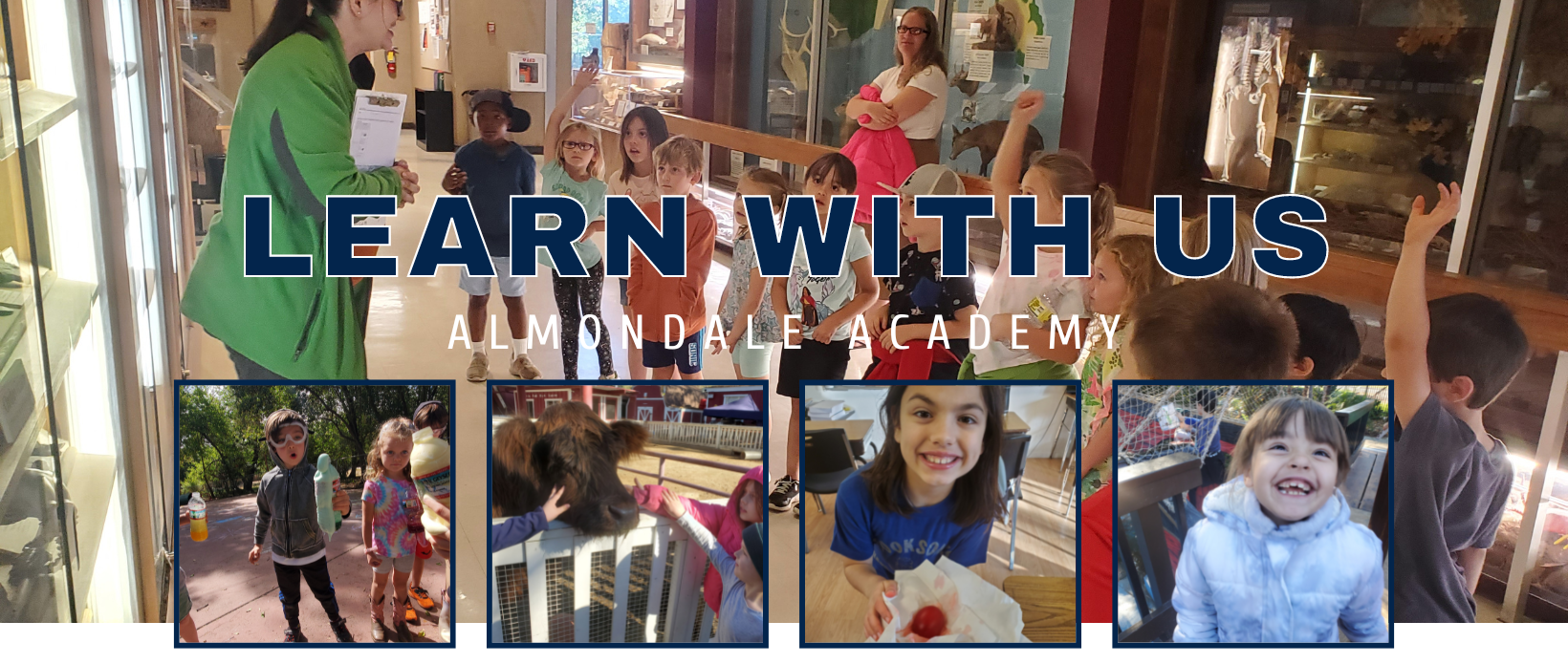Experiential Learning: Almondale’s Experiential Learning is Curriculum Fueled and Standards Based.
Experiential learning makes learning relatable, increases the effectiveness of learning, links theory to practice, increases students’ engagement, assists in memory retention and so much more! It is a hands-on, authentic education that develops the whole person through purposeful engagement, critical analysis, mindful reflection, and synthesis. We employ the predominant disciplines of Project-based education, Expeditionary learning, and Service learning.
- Project- Oriented Learning
Children are natural learners and studies demonstrate curriculum that is hands on, student directed, uses real-world scenarios, with challenges, and problems, engages students and invites them to further develop their investigative, analytical, teamwork and self-management skills. Project-based learning addresses the required content standards.
Project-based learning typically is grounded in the following elements:
- Role-playing
- Real-world scenarios
- Blended writing genres
- Multiple reading genres
- Authentic assessments
- Authentic audiences
- Real-world expertise brought into the classroom
- Units that assess multiple skills
- Units that require research and comprehension of multiple subjects
- Student choice
- Collaboration
- Multiple methods of communication (writing, oral speaking, visual presentations, publishing, etc.)
- Expeditionary Learning
Authentic education demands real world experiences and learning expeditions. Students are the most excited and engaged in concrete activities in the outer world. Learning becomes more deeply rooted, inspiring further investigation and absorption in the subject matter- developing character & intellect of students.
On a given day, their explorations may take them outside the school building to do scientific research in natural areas, conduct interviews in local businesses, or carry out a range of other fieldwork assignments.
Expeditionary excursions examples:
4th grade and up: we begin our year with an overnight team building camping trip.
4th Quarter: The students hone their science skills during a weeklong camping expedition during the fourth quarter.
End of year: three day camping excursion to celebrate a successful school year.
- Service Learning
The flourishing of character development at Almondale enables students to establish a harmonious and congenial environment on campus and off.
Our curriculum incorporates interpersonal relationships through school meetings and community service. Below you will see how Almondale students implement communication, mediation skills, and giving of themselves to the community.
School Meetings (aka Student class meetings): Students meet weekly to discuss and evaluate campus behavior. Groups take the time to practice virtuous behavior and evaluate non-virtuous behaviors on campus. This is a time where students focus on a particular virtue and put it into action by skits or role playing. At these meetings students are also given tips and ideas on interpersonal communications, while also teaching them how to dialogue and arbitrate.
For example: students have been taught the “I-statements”.
Positive Discipline: Teachers also take this opportunity to remind students that at Almondale we use Positive Discipline which assists students to work and play harmoniously together. This fosters an environment where kids can be kids. See more about this famous & working well approach here: BLOG ON POSITIVE DISCIPLE
These democratic meetings, enactments, healthy discussions and conversation techniques enable students to establish camaraderie and self-expression. Using virtues and leadership they utilize these skills, grown and developed on campus, to serve the community.
Community Service:
Community service, as many of us know, has been a part of educational systems for years. But what takes service learning to the next level is that it combines serving the community with the rich academic frontloading, assessment, and reflection typically seen in project-based learning. Our service learning is implemented into community service, which is student driven.
-Students research and vote on how best to serve their local community.
-Projects are developed and implemented during each six-week virtue session
Below are some of the acts of service, projects & activities students have engaged in:
- Students visit Almond Ave. Residence Home to entertain, converse with and play games with the residents (Tradition since the 90’s).
- Students assist in the beautification of Orangevale Parks and Recreation in beautifying Almond Park by clean up, planting trees and painting fences.
- Assisting at the Orangevale Food Bank: volunteering & collecting donations.
- Students send Valentines to hospitalized children.
- Students collect items for Christmas stockings for children in need.
- Students write letters to stroke patients.
- Students take responsibility for the campus in caring for the animals, maintenance tasks (throwing out garbage, replacing light bulbs, cleaning up after self).
- 2019-2020 project -Beautifying our campus by cleaning, sanding and painting playgrounds.
There are six specific virtues that we incorporate into our curriculum and service learning projects, as well as the communication skills that are taught and practiced which optimize harmonious relationships: Kindness, Gratitude, Sincerity, Diligence, Poise, and Wonder. To learn more about our approach, please click here.
